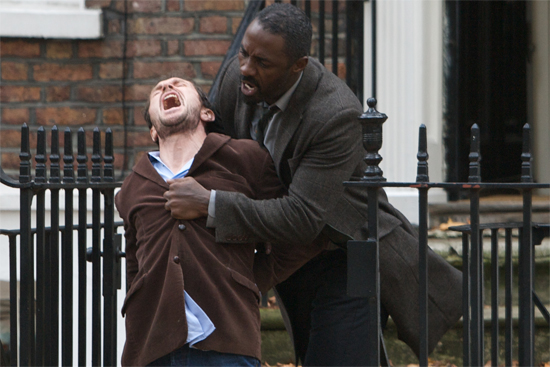When the Quietus visited the set of BBC1’s latest detective drama earlier this year, one subject was off limits. Five years after leaving his role as drug-dealing would-be business tycoon Stringer Bell in The Wire, it appears that actor Idris Elba has tired of answering questions about The Greatest TV Show Ever Made®. Does he really think we had a whole barrage of questions about Stringer lined up?
After hastily crossing out such hard-hitting journalistic nuggets as “What is Bunk like in real life?” and, erm, “What is Omar like in real life?” it was time to watch him in action.
First impression, gained from witnessing his new alter ego punch a suspect square in the chops and leave with an inadmissible DNA sample – all within easy view of anyone on the 43 bus – was that the Hackney-born actor’s overdue return to British TV (a minor role in the Beeb’s The No.1 Ladies’ Detective Agency notwithstanding) marks a gear shift from previous generations of detective series. Morse, Frost, Bergerac and Lewis it ain’t.
But, with Elba in the title role as DI John Luther, the series must compete with more than the gentle charms of TV ‘tecs Endeavour, Jack, Jim and Robert. Luther will be compared to the finest dramas from the US. For, the suspicion remains that British television is unable to match the quality, intensity and ambition of the best US dramas.
What Luther lacks, in common with almost all British dramas, is time. Telling this story in six parts, rather than 13 episodes and many seasons means there is little scope for a slow build a la Mad Men and The Wire, both of which spent time bedding in characters before the dominant story arcs began to emerge. Still, State of Play shows the possibilities offered by the six-parter, even on a BBC, rather than HBO budget.
Pre-credits we see Luther refuse to help a serial killer he has chased into a warehouse (what is it with murderers and deserted warehouses?) – choosing to let him fall to his near-death even after he’s given up the location of his latest victim. So far, so generic cop show: Luther is a maverick.
What else can we glean from the opening moves? A chess game: Yup, he’s a cop of unusual intelligence and perception. The return from suspension and jokey pep talk from his boss: He plays by his own rules but those on his team respect him. The separation from his wife? Surely his personal issues couldn’t be affected by his dedication to taking down killers, could they? Even an over-keen junior police partner who worships him seems to be plucked from the how-to-write-a-cop-show manual.
But, with Luther, the devil is in the detail. Elba displays a vulnerability that defies his imposing physique, Luther’s barely suppressed rage totally believable, his performance shot through with the subtlety that made Stringer Bell so compelling. The unspoken intimacy with his police colleagues and a stammering phone call to his estranged wife Zoe, played by Rome’s Indira Varma, testify to a welcome lack of slickness.
As Elba puts it, ‘You see his home life in a very “shouldn’t be looking” type of way. Seeing this man not coping very well with the failure of his marriage, it’s kind of like how you don’t want to see your dad cry.’
Key to the success of the series is the interplay between the two leads – Luther and child prodigy turned murderous physics genius, Alice Morgan. Played with theatrical relish by Ruth Wilson, who impressed on screen in Jane Eyre and Small Island, and on stage in A Streetcar Named Desire, Morgan looks set to be Luther’s nemesis throughout the series. Other psychos may be brought to justice on a weekly basis, but the battle of wills between a detective with anger issues and a narcissistic brainiac killer entirely lacking in empathy is the holding narrative for the series.
Again, there’s nothing new in this set up, but as Silence of the Lambs proved, when done well, these adversarial scenes of psychological combat can be captivating. Wilson’s account hints at a reason for their freshness here. ‘Idris doesn’t really learn his lines, so he just makes it up,’ she told the Quietus, adding: ‘Those long scenes were very unusual. We played with them, we’d throw in different bits and pick up on each other’s cues. He never goes that off beat, but he makes it his own.’
The supporting cast is strong (Varma, Steven Mackintosh, Paul McGann, Saskia Reeves, Warren Brown), the credits, soundtracked by Massive Attack, are the classiest for a British drama in years, which somehow feels important as a statement of intent. Judging by the opening two episodes, Luther might just succeed where recent attempts at intelligent British drama (Five Days, Collision, Criminal Justice) have failed.
A nagging fear remains that it could descend into just another formulaic detective series, but in terms of its ambition, not least in challenging the monopoly of white, middle-aged lead detectives, Luther might just buck the trend, last the distance and make us banish the box sets for a wee while…




